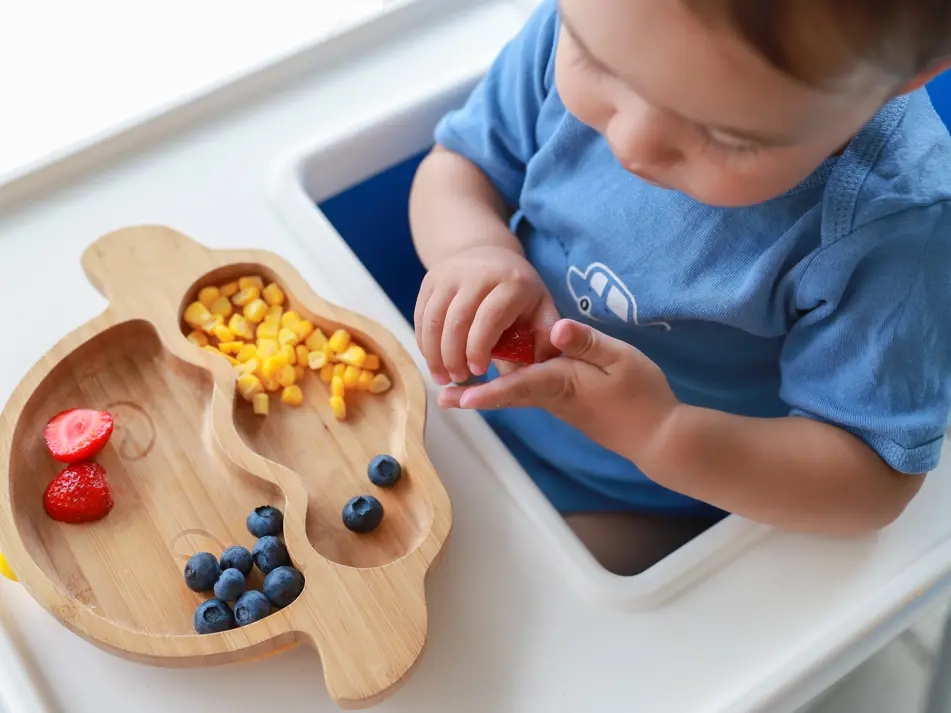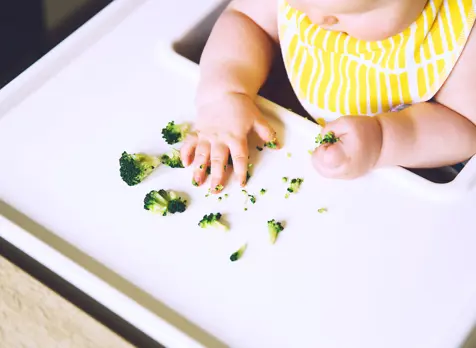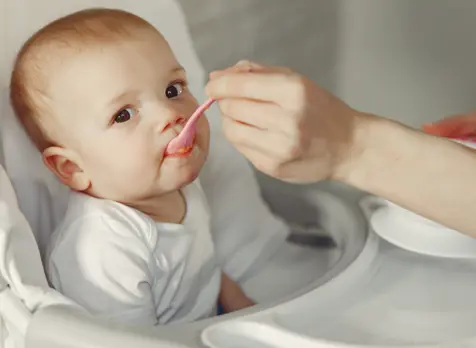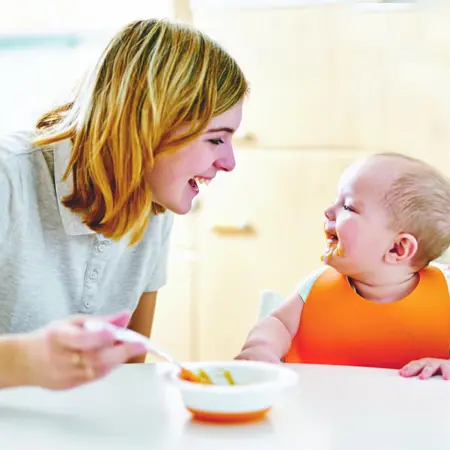When to Introduce Snacks to Baby

Foods can be introduced in any order provided they have an appropriate consistency for your baby’s developmental age.
When to introduce snacks to baby
When your baby starts solids, they need to eat iron rich food (e.g. rice cereal that has been iron fortified). Their solids may include rice cereal, pureed meat, poultry, fish and liver, or cooked tofu and legumes. Vegetables, fruits, and dairy products such as full-fat yoghurt and cheese can then be added.
By the time they get to about 9 months old, they will be on three meals a day. They will have also developed their pincer grip so it's a great time to start introducing snacks. Usually they will enjoy a snack in the morning and afternoon.
The following is only an example of the sequence and amounts to give. You can introduce other food, increase the rate of new food introduction and vary the amount depending on your baby’s hunger level and ability to tolerate the new foods.
Your baby feeding routine will change over time. Offer your baby their breastfeed or infant formula before solids so that they continue to receive adequate milk until their intake of solid foods is well established.
From around 6 months - 8 months
At around 6 months, start with one meal per day.
Gradually increase the amount and offer a variety of family foods. Some babies are happy on one meal a day while others will show obvious hunger and quickly demand two meals per day. Some meals may include a variety of mashed/minced food and some finger foods to explore.
By around 7 months old, your baby will be on at least two meals a day while some may be demanding three meals. Offer a variety of increasing textures, which is important for fine motor skill and speech development and encourages food exploration.
From about 8 month old your baby will be eating many textures, including toast fingers and soft or cooked vegetable sticks, and may be very independent at meal times. It is important that you continue to remain with your child during all meals to watch for choking risks.
From 9 to 11 months
Three meals will be enjoyed by your baby especially if they eat with the rest of the family.
Now is the time to introduce a healthy snack either in the morning or afternoon.
Snacks for 9 month old
Your baby will have started to develop their pincer grasp (using their thumb and finger to pick up objects). This means they can now enjoy using their fingers to pick up food and feed themselves.
Some easy finger foods for them to start on are scrambled egg, broken up into pieces, fresh fruit like banana, raspberries or blueberries sliced in half, shredded cheese or mashed meatballs.
Snacks for 10 month old
You could give them sliced pieces of fruit such as banana or stone fruits, cucumber, cooked carrot or potato. They might enjoy some cheese or yoghurt or some slices of toast as a snack.
Snacks for 11 month old
At 11 months old, finger foods your baby might enjoy including soft, shredded pieces of meat such as chicken, peanut or rice puffs and cooked, shredded vegetable patties.
From 12 months
At 12 months, your baby will be having three meals that are the same as the rest of the family meal.
Food is cut up in baby bite size or mashed with a fork, with lots of finger food.
Snacks for 12 month old
They will also enjoy two healthy snacks per day especially if they can feed themselves.
They might enjoy some homemade, sugar-free muffins, veggie or meat patties, pieces of cooked pasta or rice balls.
When should a 12 month old drink milk and water?
Allow your baby’s behaviour to guide whether you offer a breastfeed or infant formula before or after their solid food.
Full-fat cow’s milk and water can become the main drinks. Milk should be limited to no more than 600 mL per day.
If your baby is still breastfeeding or taking lots of milk-based foods then offer less cow’s milk. Some babies will reduce their milk intake well below 600 mL per day.
Remember, they will gain additional fluid from the food you offer (e.g. fruit and vegetables often have a high water content) and calcium from dairy products such as yoghurt and cheese.
When can my baby start eating with the family?
As soon as they start eating! Meals include so much more than just eating. The sooner your baby is included in the social aspect of meals the better. This might happen at every meal, or only at some, depending on your family circumstances. If your baby’s feeding times don’t coincide with yours, feed them earlier and give them finger food to eat while you enjoy your meal.
Be sure to give them a spoon so they can help feed themselves. Try and adapt family’s meals for baby where possible. Mealtimes are family times.












































